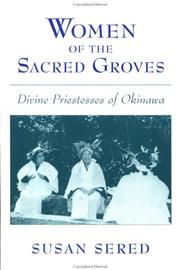| Listing 1 - 10 of 15 | << page >> |
Sort by
|
Periodical
ISSN: 27582116 Year: 1987 Publisher: [Naha] : Okinawa Kenritsu Toshokan,
Abstract | Keywords | Export | Availability | Bookmark
 Loading...
Loading...Choose an application
- Reference Manager
- EndNote
- RefWorks (Direct export to RefWorks)
Okinawa-ken (Japan) --- History --- Sources --- Okinawa (Prefecture) --- 沖縄県 (Japan) --- Sources. --- Okinawa (Japon : Ken) --- Japan --- Histoire

ISBN: 0415365007 9780415365000 9780415546881 0415546885 0203016122 9780203016121 0203016122 9780203016121 9781134217557 9781134217595 9781134217601 Year: 2006 Publisher: London Routledge
Abstract | Keywords | Export | Availability | Bookmark
 Loading...
Loading...Choose an application
- Reference Manager
- EndNote
- RefWorks (Direct export to RefWorks)
This book analyses the various ways and reasons people in Okinawa have engaged in protest against the US military since World War II and the links between such phenomena and earlier traditions of protest which are popularly encapsulated in the idea of an 'Okinawan struggle'.
Protestbewegingen. --- Japan --- Okinawa-ken (Japan) --- Okinawa. --- History. --- J3479 --- J4190.79 --- Japan: Geography and local history -- Okinawa prefecture and Ryūkyū region (Seinan) --- Japan: Sociology and anthropology -- local communities and culture -- Okinawa prefecture and Ryūkyū region (Seinan)

ISBN: 1138863092 1134427883 1280070056 0203222695 9780203222690 9781134427871 1134427875 0415298334 0203297857 9781134427833 9781134427888 9780415298339 9781138863095 Year: 2003 Publisher: London New York RoutledgeCurzon
Abstract | Keywords | Export | Availability | Bookmark
 Loading...
Loading...Choose an application
- Reference Manager
- EndNote
- RefWorks (Direct export to RefWorks)
Japan --- Okinawa Island (Japan) --- Ryukyu Islands --- History. --- Politics and government. --- Social conditions. --- J4672.79 --- J4190.79 --- J3479 --- Japan: Politics and law -- local politics and government -- Okinawa prefecture and Ryūkyū region (Seinan) --- Japan: Sociology and anthropology -- local communities and culture -- Okinawa prefecture and Ryūkyū region (Seinan) --- Japan: Geography and local history -- Okinawa prefecture and Ryūkyū region (Seinan)

ISBN: 128047162X 0195352335 0585215618 9780585215617 9781280471629 9780195124873 0195124871 9786610471621 6610471622 0195124863 0195124871 9780195124866 0195124863 9780195124866 0197741959 Year: 1999 Publisher: New York Oxford University Press
Abstract | Keywords | Export | Availability | Bookmark
 Loading...
Loading...Choose an application
- Reference Manager
- EndNote
- RefWorks (Direct export to RefWorks)
This text looks at the unique tradition of Okinawa, where women lead the official mainstream religion of the society. It explores the intersection between religion and gender. The author sees the absence of male dominance as part of a broader absence of hierarchical ideologies.
Women priests --- Women --- Human females --- Wimmin --- Woman --- Womon --- Womyn --- Females --- Human beings --- Femininity --- Priestesses --- Women in the ministry --- Priests --- Women clergy --- Religious life --- Okinawa-ken (Japan) --- Okinawa (Prefecture) --- 沖縄県 (Japan) --- Religious life and customs.
Book
ISBN: 128067993X 9786613656865 1442215836 9781442215832 9781442215825 1442215828 144221581X 9781442215818 Year: 2016 Publisher: Lanham Rowman & Littlefield
Abstract | Keywords | Export | Availability | Bookmark
 Loading...
Loading...Choose an application
- Reference Manager
- EndNote
- RefWorks (Direct export to RefWorks)
This original and fresh book explores Okinawa's makeover as a tourist mecca in the long historical shadow and among the physical ruins of the Pacific War's most devastating land battle. Gerald Figal considers how a place burdened by a history of semicolonialism, memories of war and occupation, economic hardship, and contentious current political affairs has reshaped itself into a resort destination. He traces cultural, political, social, and economic issues of Okinawa's postwar experience to the present through the innovative frame of tourism development-both as it has been i
Tourism --- Reconstruction (1939-1951) --- World War, 1939-1945 --- Postwar reconstruction --- Holiday industry --- Operators, Tour (Industry) --- Tour operators (Industry) --- Tourism industry --- Tourism operators (Industry) --- Tourist industry --- Tourist trade --- Tourist traffic --- Travel industry --- Visitor industry --- Service industries --- National tourism organizations --- Travel --- History --- Government policy --- Reconstruction --- Economic aspects --- Okinawa Island (Japan) --- Ryukyu Islands --- J3479 --- J4190.79 --- Japan: Geography and local history -- Okinawa prefecture and Ryūkyū region (Seinan) --- Japan: Sociology and anthropology -- local communities and culture -- Okinawa prefecture and Ryūkyū region (Seinan)

ISBN: 0824820371 9780824820374 0585329672 0824865499 0824875052 Year: 1999 Publisher: Honolulu: University of Hawai'i Press,
Abstract | Keywords | Export | Availability | Bookmark
 Loading...
Loading...Choose an application
- Reference Manager
- EndNote
- RefWorks (Direct export to RefWorks)
Ryukyu Islands --- History --- JP / Japan - Japon --- 203 --- J3479 --- J4190.79 --- J1008.60 --- J4600.60 --- Sociografie. Algemene beschrijving van de gemeenschappen (Sociologie). --- Japan: Geography and local history -- Okinawa prefecture and Ryūkyū region (Seinan) --- Japan: Sociology and anthropology -- local communities and culture -- Okinawa prefecture and Ryūkyū region (Seinan) --- Japan: Philosophy -- history -- Kinsei, Edo, Tokugawa period, early modern (1600-1867) --- Japan: Politics and law -- history -- Kinsei, Edo, Tokugawa period, early modern (1600-1867) --- -History --- -Ryūkyū Seifu --- Ryūkyū Rinji Chūō Seifu --- Loo Choo Islands --- Liuqiu --- Nansei Shotō --- Riukiu-Inseln --- Yugu (Islands) --- Zhongshan (Kingdom) --- History. --- Sociografie. Algemene beschrijving van de gemeenschappen (Sociologie) --- Ryūkyū Rettō --- Ryūkyū Shotō --- Ryukyu Islands - History
Book
ISBN: 1785334735 1785333860 1785333879 9781785333873 9781785333866 1800737378 Year: 2017 Publisher: Berghahn Books
Abstract | Keywords | Export | Availability | Bookmark
 Loading...
Loading...Choose an application
- Reference Manager
- EndNote
- RefWorks (Direct export to RefWorks)
In Okinawa, the southernmost prefecture of Japan, "ecotourism" promises to provide employment for a dwindling population of rural youth while preserving the natural environment and bolstering regional pride. Footprints in Paradise centers on how Okinawans' sense of place is transforming rapidly, along with language, landscapes, cultural traditions, and wildlife: from marginalized and exoticized island phenomena into global heritage resources worth cherishing by insiders and outsiders. Footprints in Paradise is intended for readers interested in the anthropology of US-Japan-Okinawa relations, tourism and island environments, the politics of ecological sustainability, and the shifting ethics of human-animal relationships in the early twenty-first century.
Ecotourism --- Economic development --- Development, Economic --- Economic growth --- Growth, Economic --- Economic policy --- Economics --- Statics and dynamics (Social sciences) --- Development economics --- Resource curse --- Eco-tourism --- Eco-travel --- Ecological tourism --- Ecotravel --- Environmental tourism --- Green tourism --- Nature tourism --- Tourism --- Anthropology --- Coral --- Japan --- Mongoose --- Okinawa Prefecture
Book
ISBN: 9783862887736 3862887731 Year: 2017 Publisher: München : Lincom,
Abstract | Keywords | Export | Availability | Bookmark
 Loading...
Loading...Choose an application
- Reference Manager
- EndNote
- RefWorks (Direct export to RefWorks)
It is rather rare to see Okinawan poetry translated into English. But this volume presents just such a collection of Okinawa?s own poetic form, the ryuuka. With its typical four lines of thirty syllables (i.e., 8,8,8,6), a ryuuka embodies poetic compression to an extent greater than its famous cousins, Japanese waka or tanka, with their thirty-one syllables and five lines (i.e., 5,7,5,7,7). The ryuuka appearing here are drawn from a time span of several hundred years. The authors present poems of Aragusuku Anki, Arakaki Rintoku, Chatan Ooji, Goeku Aji, Heshikiya Choobin, Kume Gushikawa Ooji Chooei, Motobu Aji Chookyu, Motobu Aji, Motobu Ooji, Saion, Shootoku Oojo, Tamagusuku Chookun, Teijunsoku, Tsuken Oyakata, Unna Nabii, Yonabaru Oyakata, Yushiya Chiruu and Zukeran Oyakata Teuki. A Hundred Waves also includes a note on translating Okinawan poetry, a pronunciation guide for Romanization and concludes with an index.
Japanese poetry --- Ryukyuans --- Poésie japonaise --- Ryūkyū (Peuple d'Asie) --- History and criticism --- Histoire et critique --- Ryukyuan literature --- Ryukyuan poetry --- Japanese literature --- Ryukyu poetry --- Ryukyu literature --- Ryukyu Islands --- Ryūkyū Seifu --- Ryūkyū Rinji Chūō Seifu --- Loo Choo Islands --- Liuqiu --- Nansei Shotō --- Riukiu-Inseln --- Yugu (Islands) --- Ryūkyū Rettō --- Ryūkyū Shotō --- Zhongshan (Kingdom) --- J5700 --- J5570.79 --- Japan: Literature -- poetry in general --- Japan: Literature -- local literature -- Okinawa prefecture and Ryūkyū region (Seinan)
Book
ISBN: 9784866581316 486658131X Year: 2020 Publisher: Tokyo Japan Publishing Industry Foundation for Culture
Abstract | Keywords | Export | Availability | Bookmark
 Loading...
Loading...Choose an application
- Reference Manager
- EndNote
- RefWorks (Direct export to RefWorks)
Cooking --- Cooking, Japanese --- Ryukyu style. --- Diet therapy --- Functional foods --- J4152 --- J4190.79 --- Cookery --- Cuisine --- Food preparation --- Food science --- Home economics --- Cookbooks --- Dinners and dining --- Food --- Gastronomy --- Table --- Designer foods --- Medicinal food --- Medicinal foods --- Neutraceuticals --- Neutriceuticals --- Nutraceuticals --- Nutriceuticals --- Pharmafoods --- Clinical nutrition --- Diet --- Diet and disease --- Dietotherapy --- Medical nutrition therapy --- MNT (Medical nutrition therapy) --- Nutrition therapy --- Dietetics --- Therapeutics, Physiological --- Cookery, Ryukyuan --- Cooking, Okinawan --- Cooking, Ryukyuan --- Okinawan cooking --- Ryukyuan cooking --- Ryukyu style --- History --- Japan: Sociology and anthropology -- customs, folklore and culture -- food --- Japan: Sociology and anthropology -- local communities and culture -- Okinawa prefecture and Ryūkyū region (Seinan) --- Therapeutic use
Book
ISBN: 0739182498 9780739182499 1306518040 9781306518048 9780739182482 073918248X Year: 2014 Publisher: Lanham, Maryland
Abstract | Keywords | Export | Availability | Bookmark
 Loading...
Loading...Choose an application
- Reference Manager
- EndNote
- RefWorks (Direct export to RefWorks)
Tze May Loo's Heritage Politics examines Okinawa's relationship with the Japanese nation-state from 1879 to 2000 through the lens of cultural heritage. This book is a study of the politics of cultural heritage: how the Japanese state and American occupation authorities used-and continue to use-heritage to govern Okinawa, and how Okinawans use it to negotiate, resist, and contest Japanese and American impositions of power.
Cultural property --- Cultural heritage --- Cultural patrimony --- Cultural resources --- Heritage property --- National heritage --- National patrimony --- National treasure --- Patrimony, Cultural --- Treasure, National --- Property --- World Heritage areas --- Protection --- History. --- Political aspects --- Shurijō (Naha-shi, Japan) --- Okinawa Island (Japan) --- Japan --- al-Yābān --- Giappone --- Government of Japan --- Iapōnia --- I︠A︡ponii︠a︡ --- Japam --- Japani --- Japão --- Japon --- Japonia --- Japonsko --- Japonya --- Jih-pen --- Mư̄ang Yīpun --- Nihon --- Nihon-koku --- Nihonkoku --- Nippon --- Nippon-koku --- Nipponkoku --- Prathēt Yīpun --- Riben --- State of Japan --- Yābān --- Yapan --- Yīpun --- Zhāpān --- Япония --- اليابان --- يابان --- 日本 --- 日本国 --- Ryukyu Islands --- Colonization. --- Relations --- History --- J3479 --- J6565 --- J6001 --- Japan: Geography and local history -- Okinawa prefecture and Ryūkyū region (Seinan) --- Japan: Art and antiquities -- architecture -- castles --- Japan: Art and antiquities -- policy, legislation, guidelines, codes of behavior --- Jepun --- Yapon --- Yapon Ulus --- I︠A︡pon --- Япон --- I︠A︡pon Uls --- Япон Улс
| Listing 1 - 10 of 15 | << page >> |
Sort by
|

 Search
Search Feedback
Feedback About UniCat
About UniCat  Help
Help News
News